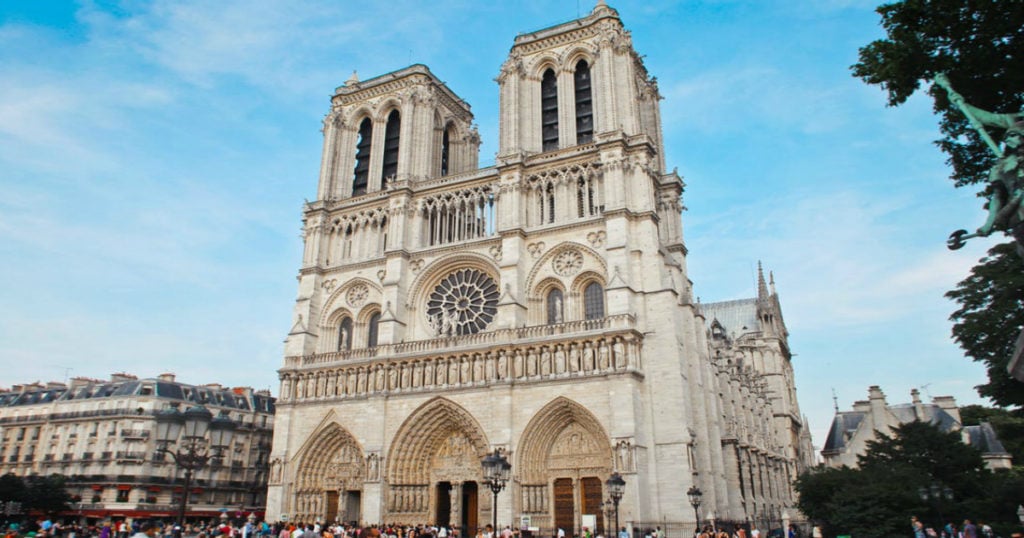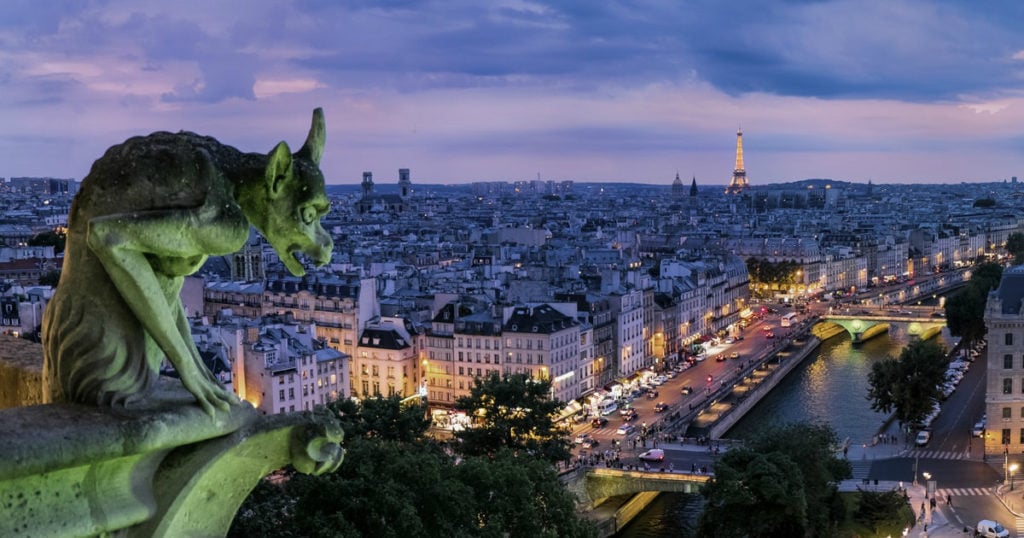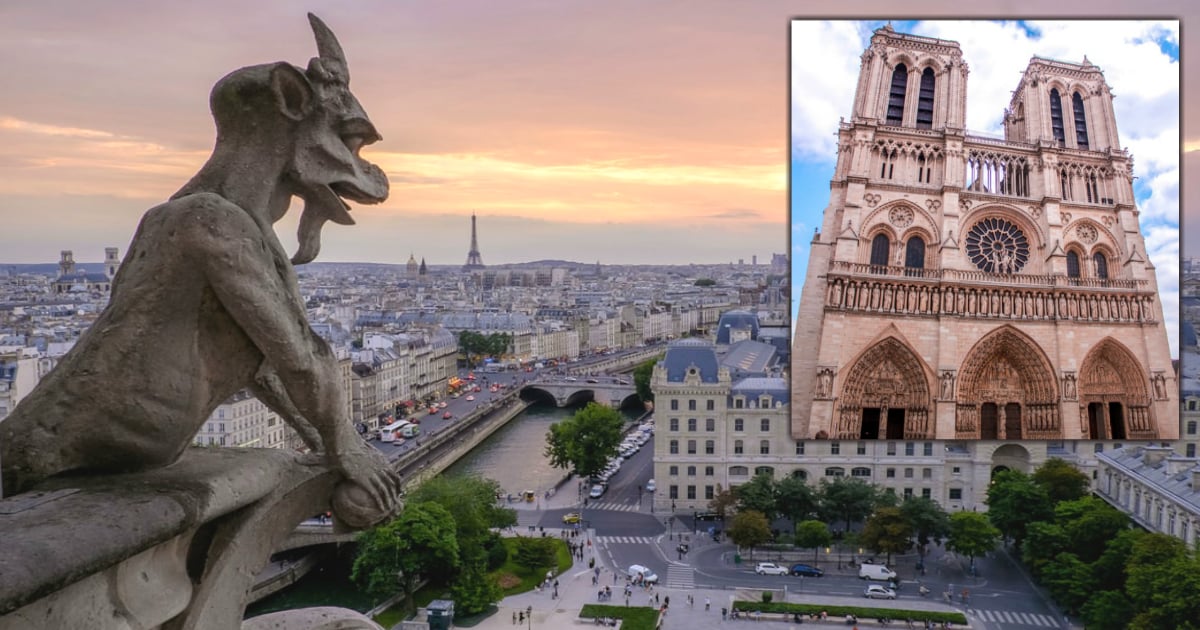The gargoyles of Notre Dame Cathedral in Paris, France have watched over this famous place of worship for centuries. Here’s the fascinating story behind what they are and why they exist.
For some, gargoyles may seem like a bizarre addition to a place of worship. However, these intimidating creatures are more than just folklore. They serve a very practical purpose as well.
RELATED: 7 Things You Probably Never Knew About The Last Supper Painting
But first, let's take a look at the history of the famous Notre Dame Cathedral.

Credit: Pexels/Adrienn
Notre Dame Cathedral Facts And History
- The name means Our Lady
- One of the most famous landmarks in Paris, drawing around 13 million visitors per year
- A world-famous marvel of medieval Gothic architecture
- Sits on a natural island in the middle of the Seine river
- Construction began in 1163 under Bishop Maurice de Sully and lasted 182 years, finally reaching completion in 1345
- Added the flying buttresses in the 14th century for structural support necessary to house more than 6,000 worshipers inside
- Some of the cathedral's architectural feats include the flying buttresses, an 8,000-pipe organ, stained glass Rose Windows, and of course home to the grotesques and gargoyles of Notre Dame Paris
- Home to many world-renowned relics including the crown of thorns believed to be worn by Jesus Christ during His crucifixion, the tunic of Saint Louis, famous church artwork such as "The Visitation", and much more
“It is indeed one of the most incredibly beautiful and important medieval cathedrals in the world,” New York-based travel agent and Paris expert Yaron Yarimi once told CNN.
So, why put gargoyles on the Notre Dame Cathedral? Read on to hear the interesting history behind these famous statues.
Famous Gargoyles Of Notre Dame Cathedral
In our modern times, it may seem odd to see gargoyle statues looming from the top of a cathedral. But here are some gargoyle facts that may help explain their presence.

Credit: Unsplash/Pedro Lastra
Culturally Appropriate
During the time construction began on the now world-famous cathedral, gargoyles were a popular feature of the Gothic style. And as one of the world’s finest examples of Gothic architecture, it’s no wonder the Notre Dame Cathedral would include these figures, too.
RELATED: 5 Myths About Angels And Demons That Just Won't Die
Protection Of THe Building
The word gargoyle gets its origins from the French word gargouille, which means throat or gullet. These stone creatures were designed with spouts coming out of the mouth, which serves to filter rainwater away from the edge of a building. These spouts essentially act as drainpipes, protecting the building from erosion.
Local Legend Inspires Gargoyle Statues
There was a popular French legend at the time of a terrifying, fire breathing dragon called “La Gargouille”. This cruel beast was said to terrorize the French village of Rouen until a priest named Romanus came to help.
Upon the village’s conversion to Christianity, Romanus agreed to defeat La Gargouille. In some versions, he did so by making the sign of the cross. In others, the priest used his crucifix to vanquish the dragon.
Afterward, they burned La Gargouille at the stake. His head and neck would not burn. And so, the villagers mounted it onto the outside of their new church to ward off evil spirits.
Reminder Of EvIl
Gargoyle statues serve as a physical reminder of the evil that exists in the world. This was important during the Gothic era because many people didn’t know how to read. So, churches used gargoyles as a way to illustrate the sanctuary offered inside. Outside the walls lay evil and sin. Inside lay forgiveness, protection, and salvation.
Types Of Gargoyles Of Notre Dame
Many use the term gargoyle to lump all of the demon-like stone creatures atop the Notre Dame Cathedral. But, that’s not entirely accurate.
The Gargoyles#NotreDame pic.twitter.com/pkoW6PpL0A
- Dave/Dim (@dimspace) April 15, 2019
Grotesques is the generic term used to encompass the stone statues of mythical creatures popular during the Gothic era. It applies to the statues whether their purpose is practical or purely decorative.
Gargoyles are specifically the statues with draining spouts, used to funnel water away from the building. These statues typically protrude from the building.
Chimera were created simply as decoration on the Notre Dame Cathedral. Unlike the gargoyles, these statues do not protrude from the roof. Instead, they line the Galerie des Chimères, a balcony that connects the two bell towers. They were added to Notre Dame later, during a restoration in 1844 by architects Jean-Baptiste-Antoine Lassus and Eugène Viollet-le-Duc. These statues range from intimidating animals, bizarre hybrids, and mythical creatures.
WATCH: Gargoyles History And Evolution
Two of the most famous chimeras of Notre Dame are the Wyvern and Stryga. The Wyvern is a two-legged winged dragon. The Stryga sits with his horned head in his hands with his tongue sticking out. He is sometimes affectionately called "the Spitting Gargoyle".
❤ #Paris #Parigi #NotreDame #incendio #gargoyles #Church #cathedral #ViveLaFrance pic.twitter.com/6LOD4V0KPk
- Luca Cirillo (@LukeTweet75) April 16, 2019
Notre Dame Cathedral Fire
Sadly, on April 15, 2019, a fire engulfed Paris’ beloved Notre Dame Cathedral.
"Today, the gargoyles of Notre Dame weep," one man wrote on Twitter during the tragic event that held the world captive.
It is unclear exactly how the fire started, though French authorities have ruled out terrorism or any kind of intentional criminal activity. Instead, most suspect the cause of the Notre Dame fire to be electrical — either from the existing wiring in the old building or as part of the restoration project that was underway at the time.
RELATED: California Pastor Recalls How Church Miraculously Survived Wildfire Untouched
Five hundred firefighters worked tirelessly and put out the blaze in about nine hours. By then, the fire had consumed and destroyed nearly two-thirds of the roof. Additionally, the cathedral's 300-foot spire collapsed.
While the damage from the fire on this iconic building is heartbreaking, many rejoiced over what escaped the destruction. The building's iconic rose windows, pipe organ, and famous gargoyles of Notre Dame, Paris were spared. People came together and formed a human chain to save priceless relics like the Crown of Thorns.
Restoring Notre Dame To Its Former Glory
Plans to rebuild and restore the Notre Dame Cathedral are underway, with donations pouring in from all over.
"It is our history," French president Emmanuel Macron said after the fire. "We will rebuild Notre-Dame together because that is what our history deserves."
The goal is to have the repairs completed in time for the 2024 Summer Olympics.
The gargoyles and Notre Dame Cathedral have been around for centuries, so this certainly isn’t the first time there has been a need for restoration. And the building already survived a fire during the French Revolution.
YOU MAY ALSO LIKE: Story Behind Pic From September 11 Photos That Was So Sad, Newspapers Only Published It Once
And now that you know the fascinating history of the gargoyles of Notre Dame Cathedral, we will wait in anticipation for the day they return to their iconic home in Paris!
“When you go through the waters, I will be with you; and through the rivers, they will not go over you: when you go through the fire, you will not be burned; and the flame will have no power over you.” Isaiah 43:2
LISTEN: Story Behind the Secret Inscription Only 3 People Know on Wedding Ring of Queen Elizabeth
h/t: The Vintage News
Featured Image: Unsplash/Pedro Lastra & Hannah Reding






